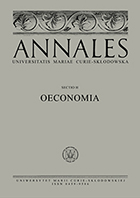Impulsywne oszczędności osób młodych - wyniki badania eksperymentalnego
Impulse Saving of Young Adults - Results of Experimental Study
Author(s): Mariusz KiciaSubject(s): Economy, Financial Markets, Socio-Economic Research
Published by: Wydawnictwo Naukowe Uniwersytetu Marii Curie-Sklodowskiej
Keywords: finanse behawioralne; oszczędności emerytalne; torowanie; księgowanie mentalne; oszczędzanie impulsywne; behavioural finance; pension savings; priming; mental accounting; impulse saving
Summary/Abstract: The article presents analysis of priming effect on distribution of income among impulsive consumption, short-term savings and long-term pension savings declared by young adults. Students of economics and management (N=212; 152 women; mean age=21.33 M [0.931]) were asked to split hypothetical income of PLN 1.000 among the four objectives, retirement savings among them. An excerpt from newspaper article noting that pensions in Poland in 2060 were expected to be very low, had been presented to experimental group (N=96) prior to decision task. Differences in distribution of amounts between experimental and control group were analysed. Current expenses for participants’ pleasure as well as their close ones were cut in the experimental group and average amount declared as pension savings increased from PLN 80.69 (control group) to PLN 211.10. However, savings to current bank account remained unchanged. Age, gender, employment experience and the way participants received income (either earned or won/found) did not moderate distributions. Logistic regression analysis revealed that 2.4-fold increase of likelihood of saving amount declarations above the average (PLN 139.75) was caused by appearance of persuasive information only. Circumstances of decision-making suggested that in the analysed case, priming effect led to impulsive rather than rational saving.
Journal: Annales Universitatis Mariae Curie-Skłodowska, Sectio H Oeconomia
- Issue Year: L/2016
- Issue No: 3
- Page Range: 61-72
- Page Count: 11
- Language: Polish

